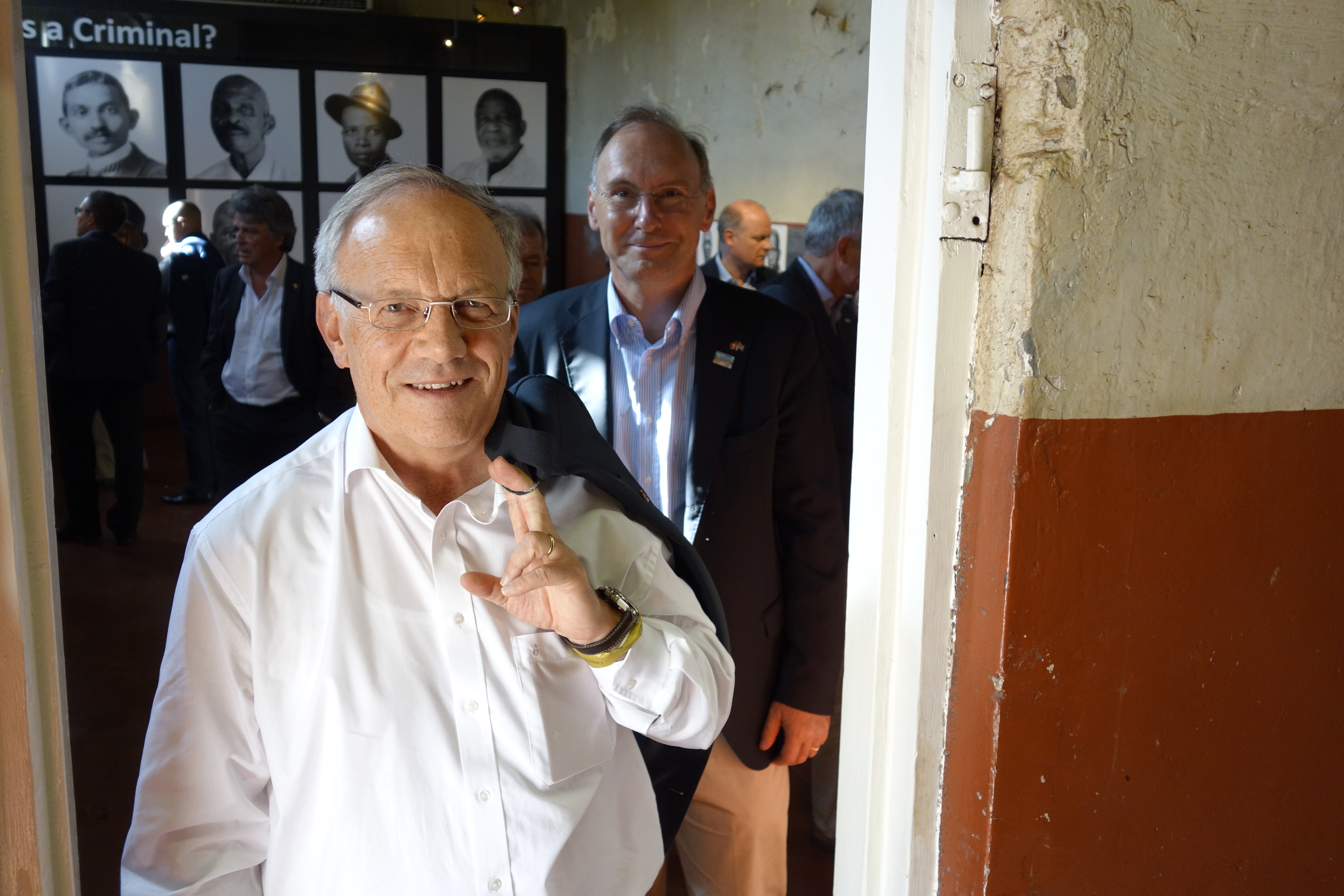Swiss aim to strengthen trade and science ties

South Africa is Switzerland’s most important African trade partner – a point underscored in an official visit by Swiss Economics Minister Johann Schneider-Ammann. It was the first time a Swiss delegation included key members of the business as well as science communities.
“We wanted to open doors for our private sector representatives and contact the scientific community, and I wanted to get to know my South African colleagues and reactivate our personal ties. We achieved all of that,” Schneider-Ammann told swissinfo.ch.
The economics minister, who had visited South Africa as an entrepreneur prior to his political career, said the country had changed “tremendously”.
“The open-minded discussions we had with the business and science experts demonstrates to me that South African society has become calm and open. It’s a different spirit to what I knew ten to 15 years ago,” Schneider-Ammann said.
Organised by the Federal Department of Economic Affairs, Education and Research, the three-day mission was an opportunity for Swiss and South African professionals to network and discuss potential synergies.
“Switzerland has been an important partner for South Africa in its transition phase,” Rob Davies, South Africa’s Minister of Trade and Industry, told the participants of the South African-Swiss Business Forum in Cape Town on Thursday. “This is the right time for us to strengthen our partnership.”
At the same time, he highlighted his country’s appeal to foreign investors. In particular, he said that there were partnership opportunities for improving South Africa’s infrastructure – especially green technology.
Powering ahead
Energy was a recurrent theme of the trip, which included a visit to the South African head office of Swiss-Swedish power and automation company ABB as well as presentations by South African electricity company Eskom and Swiss commodities giant Glencore.
There was also a visit to Console Glass, a Johannesburg-area bottle and jar maker that has benefitted from a partially Swiss-funded programme to help companies reduce their energy consumption.
“One of the most encouraging things on this visit has been the emphasis on energy and the environment coming from the highest political level of the two countries,” pointed out Edwin C. Constable, Vice-Rector for Research at Basel University.
“Democracy has happened, and an empowerment of the majority of the people,” Constable told swissinfo.ch. “I think the country is still in a state of change, but I’m extremely optimistic and I think that in education and science, all of the right moves are being made.”
South Africa is Switzerland’s most important trading partner on the African continent, with bilateral trade volume amounting to CHF 1.7 billion in 2012.
More than 100 Swiss companies are active in South Africa in a broad range of sectors. In 2012, they employed around 35,000 people in South Africa.
Swiss direct investments in South Africa amounted to more than ZAR 46 billion (CHF 4.3 billion) at the end of 2010.
Economic cooperation between the two nations included a set of bilateral accords, including free trade and agriculture agreements.
South Africa is one of eight non-European countries which Switzerland has chosen as a priority partner in education, research and innovation.
In 2007, the two nations created the Swiss-South African Joint Research Programme. Now in its second phase, the focus is on renewable energies.
South Africa became a priority country for economic development in 2005. Since then, funds of CHF 74 million have been allocated.
Source: Swiss Embassy in South Africa
Back to school
The mission included various education and research-related elements, including meetings with Blade Nzimande, South Africa’s Minister of Higher Education and Training, and Derek Hanekom, South Africa’s Minister of Science and Technology.
Schneider-Ammann highlighted Switzerland’s vocational training system that combines classroom theory with practical experience. The fact that two out of three Swiss take part in such programmes has contributed to Switzerland’s low unemployment rate, he pointed out.
In addition to passing on vocational training tips to South African counterparts, Schneider Ammann also called for continued higher education collaboration between the two countries.
The delegation also took a tour of the laboratories at the Council for Scientific and Industrial Research (CSIR) in Pretoria, South Africa’s capital. The publically-funded research institute collaborates with local and international firms to create marketable products.
One of these firms is Swiss food giant Nestlé. Sullivan O’Carroll, Chairman and Managing Director of Nestlé’s Southern African region, told swissinfo.ch about research being done on a spinach-like plant native to the area.
“Our hope is that by working together and combining our knowledge, we can find a way to commercialise and promote traditional African ingredients,” O’Carroll said. Sibusisu Sibisi, the CEO of CSIR, agrees that there could be some excellent results.
“If Nestlé can create a packaged food, that could go a long way to meeting nutritional needs. And we’re not just talking about the commercialisation of a crop, but rather about empowering local communities and creating jobs,” Sibisi told swissinfo.ch.
Not for everybody
Daniel Küng, the CEO of Switzerland Global Enterprise, told swissinfo.ch that the launch of the Pretoria business hub in 2007 got off to a somewhat bumpy start but that it was doing well now.
“Over a long period of time, this was the only African country with a decent risk rating, which allowed Swiss companies to consider it as a destination,” said Küng, who accompanied Schneider-Ammann.
While he wouldn’t recommend that everybody get a foothold in South Africa, he finds that some sectors are particularly promising – especially for larger companies. These industries include infrastructure, energy, transport, machinery, automotive supplies, medical technology and precision instruments.
“Nowadays I wouldn’t invest in extraction, minery or construction because I think that these are industries which have a heavy stance at the moment, be it for overcapacity, lack of raw materials or just because they are in an environment that needs regulatory change,” Küng said.
Max Bertschmann, head of the Swiss Business Hub South Africa in Pretoria, also advises companies interested in doing business in South Africa. He says there are a number of challenges that can hinder a successful start there.
“It’s quite difficult to find skilled workers, so a company has to be prepared to transfer knowledge and skills through on-the-job training,” Bertschmann told swissinfo.ch. He also cites bureaucracy as a time-consuming hurdle during the start-up phase.
Labour strikes are also a reality that many companies must budget for, but Bertschmann says Swiss companies are often spared.
“They’re not that affected by strikes, I must say. Swiss companies are known for better salaries, training and fringe benefits; they’re aware that behind one worker, there might be a family of 20.”

In compliance with the JTI standards
More: SWI swissinfo.ch certified by the Journalism Trust Initiative



You can find an overview of ongoing debates with our journalists here. Please join us!
If you want to start a conversation about a topic raised in this article or want to report factual errors, email us at english@swissinfo.ch.